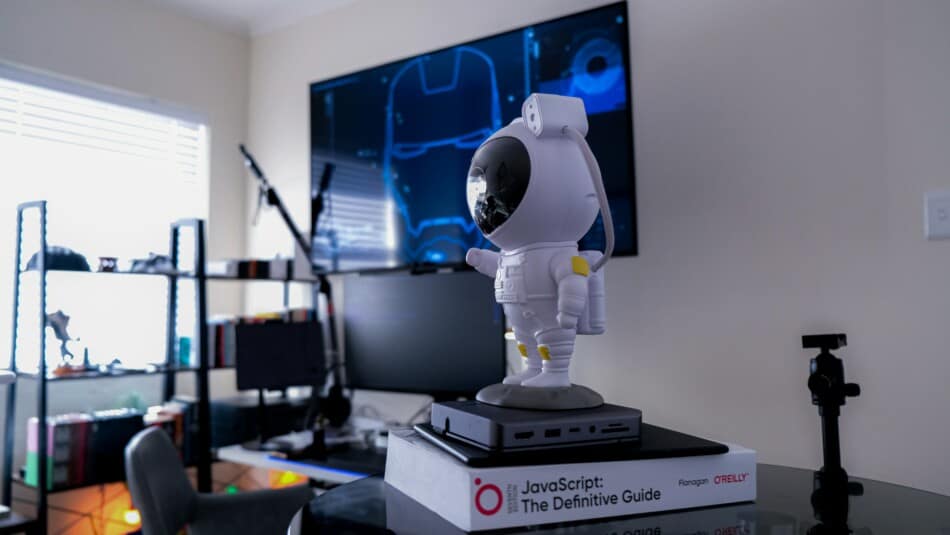It may be hyperbole to claim that JavaScript is a developer’s best friend, but it would not be easy to get by without it.
Whether they like it or not, ambitious developers must learn JavaScript. The explanation is simple: it’s simply too handy.
So, can you learn JavaScript on your own, or is it a skill best taught in a professional setting?
There are several methods for quickly learning JavaScript. You do not need to enroll in an undergraduate computer science degree to do it. Several online free or paid courses, self-paced tutorials, and more are available to help individuals learn JavaScript independently.
Despite its wide range of applications and colossal library network, JavaScript is not a complex language to learn. Thanks to its human-readable syntax and dynamic typing, it’s downright user-friendly.
You might wonder how much JavaScript you can learn on your own, where to begin, and why you should learn it.
That said, let’s explore all of this in even more detail.
To What Degree Can Your Lean JavaScript On Your Own?
Because JavaScript is a higher-level language, it is more human-readable and hence more accessible to grasp and learn than a lower-level or machine-readable language.
Although higher-level languages require a compiler or interpreter to translate and make them accessible to computers, they abstract away the intricacies that machines require.
As a result, people find it more straightforward to learn on their own.
Not only is JavaScript a high-level language, but it also runs on your browser, allowing you to begin writing without the need for a development environment.
This appeals to novice programmers who may not want to learn how to traverse an environment in addition to learning a new language.
Aside from its language characteristics, which make it easy to learn, JavaScript has a large community — sometimes known as an ecosystem — that helps other developers and adds to dialogues, not to mention libraries, in the JavaScript world.
Furthermore, JavaScript has the largest StackOverflow community, is the language with the most tags on Github, and has hundreds of libraries.
Because of the size of this ecosystem, you will be able to construct valuable apps using its well-documented open-source libraries swiftly.
Not only that, but because so many people are creating valuable tools and contributing to the ecosystem, you’ll have plenty of assistance and advice available if you need to troubleshoot or question best practices.
-> Read Also What Is An Autodidact?
How Long Would It Take To Learn JavaScript?

One of the first queries people have is how long it takes to learn a coding language. While JavaScript is a level ahead of the essential web development abilities (languages like HTML and CSS, which can be acquired in under a month).
That said, you can still expect to master the fundamentals of JavaScript in a matter of months, not years—whether you learn through online classes or self-study.
If you learn independently, it may take between six to nine months to become proficient with JavaScript. However, some of that time is spent learning how to think like a programmer, which will be helpful when studying other programming languages.
On the other hand, the period it takes to learn JavaScript is heavily influenced by your methodology. So choose from online courses, in-person classes, and books based on what works best for you.
If learning JavaScript is prioritized on top of your list, several online courses can teach you the language in as short as three months (if you pace yourself at an hour a day).
Is it simple to learn JavaScript principles if the timeline is a manageable matter of months? Both yes and no. JavaScript isn’t the most complicated programming language, but remember that everyone has various learning challenges.
One important thing to remember when studying JavaScript (independent of your particular learning requirements or style) is to avoid the desire to rush through the fundamentals.
JavaScript is a self-contained programming language. As a result, more complex JavaScript code is far more challenging to develop and understand if you don’t have a hard grasp of the fundamentals.
– > Read also Can You Learn HTML On Your Own?
The Best Ways To Learn JavaScript (Free And Paid)
When you start educating yourself on web development basics, the enormous amount of materials available may overwhelm you.
As a result, the following are some of the favorite JavaScript learning tools to get you started.

1. Websites And Courses For JavaScript Self-Guided Learning
Above all, the Internet is a knowledge warehouse. Therefore, flexible online courses may be the educational solution for you if you are interested in self-directed learning or just do not have the time to enroll in a formal program.
These free and paid online courses will teach you how to learn JavaScript quickly, but remember that “free” does not always imply “better.” In addition, free applications sometimes have less direction and support than premium options.
That said, doing some research beforehand to see if their teaching methods fit your learning style is always recommended!
FreeCodeCamp – Introduction To JavaScript
- FreeCodeCamp’s Introduction to JavaScript is designed for aspiring programmers with no prior understanding of JavaScript. Its classes cover web programming, data types, and JavaScript objects and loops in depth.
This course also includes a code test at the end of each lesson to allow students to demonstrate and reinforce their technical knowledge.
- Cost: Free
Khan Academy – Intro to JS: Animation And Drawing
- As the name implies, Khan Academy’s Intro to JS: Animation And Drawing teaches students how to make graphics and animations using simple JavaScript code. It organizes its teachings using a variety of videos, textual guidelines, and activities.
- Cost: Free
Udemy – Modern JavaScript From The Beginning
- Modern JavaScript From The Beginning by Udemy is a premium program that offers over 20 hours of on-demand video content and a collection of downloadable tools to JavaScript beginners. Students can work at their own speed and access course materials via computers, mobile devices, or television.
There are also over 100 downloadable tools, and students will receive a certificate upon completion.
- Cost: $99.99 – Full lifetime access to material
Codecademy – Introduction To JavaScript
- Codecademy’s Introduction to JavaScript is a premium curriculum that covers an in-depth review of JavaScript’s fundamental concepts, such as data types and functions, objects, and control flows and loops. It also includes post-lesson quizzes and practical activities to help you remember what you learned.
- Cost: $149.99 per year – Access to all Codecademy courses

2. JavaScript Books
When in doubt, pick up a book. While other books can provide practical programming insights, the two volumes listed below are treasured for aspiring programmers who wish to learn JavaScript promptly.
JavaScript For Kids
- Author: Nick Morgan
- Buy on Amazon
- Don’t be misled by the title. While Nick Morgan’s amusing work was created for a young readership, its streamlined, readily consumable teachings can also benefit adult learners.
This book provides straightforward overviews of fundamental explanations of strings, arrays, and loops, as well as more advanced studies of jQuery and visual development. It also includes step-by-step tutorials for basic programming games.
You Don’t Know JS: Up And Going
- Author: Kyle Simpson
- Buy on Amazon
- You Don’t Know JS isn’t a book for complete novices, despite what the title would suggest. It may apply to them, but it is not restricted to beginners.
“It’s simple to learn bits of JavaScript, but much difficult to master it entirely — or even enough — whether you’re new to the language or have used it for years,” says the book’s back flap.
You’ll obtain a more thorough grasp of JavaScript with the ‘You Don’t Know JS’ book series, covering tougher portions of the language that many experienced JavaScript programmers just avoid.”
Finally, this is the first in a series that will explore the technical intricacies of JavaScript. It covers the “basic building blocks of programming” and the fundamentals of JavaScript.
3. Coding Boot Camps For JavaScript
Maybe self-education isn’t for you. While you are aware that you could study through an on-demand self-guided course or the activity chapters of a book, you would like a bit extra help and supervision during your educational journey, as well as a certificate upon completion.
So, a coding boot camp may be your best option if this is the case. Boot camps have risen to fame recently as a way to rapidly obtain marketable skills without investing the time or money that regular four-year university programs need.
The standard boot camp lasts between a few weeks and a few months, depending on whether the structure is part-time or full-time.
4. Begin Your Own JavaScript Projects
What was the point of studying in the first place if you didn’t put your hard-earned information to use? Of course, at some point, budding developers must go beyond tutorials and into actual, honest-to-goodness programming. But the changeover isn’t always easy.
You might feel intimidated by creating an app from scratch outside of the safe confines of step-by-step projects. However, if you continue to rely on instructions, you will never be able to exercise your imagination or take your initial steps toward autonomous development.
Programming is the most excellent method to learn how to code, but you don’t have to dive into a large project from the get-go.
Begin small. When you are ready to apply your JavaScript abilities to an actual project, consider adding a feature to an instructional program rather than beginning a new application from scratch.
Alternatively, start with an existing framework and develop Chrome extensions. If you require assistance, consider collaborating on a project with a buddy.
The most challenging phase is always the initial attempt to remove the lesson training wheels. Not sure where to begin? To apply your JavaScript expertise to a new project, try a couple of the projects mentioned below!
Build a drum kit with JavaScript
You may use JavaScript to create a digital drum set that allows you to play different sounds based on a home-built keyboard. You can sync your JavaScript code with event listeners, key codes, and CSS transitions.
To begin, follow Varun Barad’s instructions on Dev.

Create a Tic-Tac-Toe game
Sometimes the most simple games result in the most helpful enterprises. Follow Ethan Ryan’s Level Up instructions to construct a playable, repetitive game in JavaScript.
Create an HTML Calculator
In roughly an hour, you can create a basic calculator. In addition, FreeCodeCamp provides detailed lessons on thinking through the creation process, creating code, and polishing your work once you’ve written it.
After going through the steps, you should be able to create a reasonable simulation of a mobile calculator. Whatever method you choose to learn JavaScript will require time, effort, and devotion.
There are various schooling choices available to you, whether you want to become a front-end developer or if you are already in the sector and want to expand your professional skill set.
You could discover that broadening your employment horizons isn’t as difficult or expensive as you expected.
JavaScript Certification To Use As A Profession
The education requirements for this position differ depending on the business, although most prefer a bachelor’s degree in computer science or computer programming.
However, a degree is unnecessary, and recruiting applicants who have completed a coding Bootcamp is becoming increasingly popular in the tech and startup industries. This employment does not require any certificates or years of experience.
Because JavaScript is the most common language in the world and the foundation of most online sites, JavaScript Developers may find work in almost every country and business.
They work for startups, corporations, the government, medical firms, small enterprises, merchants, and other organizations. This skill set has onsite and remote full-time employment and plenty of freelancing options.
The demand for JavaScript developers is high, and the pay is good. While wages vary by company and area, JavaScript is a talent that will make you highly marketable in practically any market and sector.
-> Learn More about Self-Learning vs. Classroom Learning: Which Is Better?
Profession Related To JavaScript

A website uses JavaScript to create and manage dynamic information. In contrast, mark-up languages such as HTML and CSS tell web browsers how to display a website by specifying static elements such as headers, typefaces, paragraphs, etc.
JavaScript performs elements on the website that require real-time updates without requiring the user to refresh the screen, such as interactive maps, dynamic graphics, scrolling movies, jukeboxes, and so on.
Because most websites will ultimately demand content and features other than static text, JavaScript is vital to the HTML and CSS basis.
– > Read also How To Self-Learn CSS
In addition, JavaScript is used daily for activities such as adding and updating JavaScript content on existing websites, repairing errors in pre-existing code, and even creating new JavaScript features from scratch.
Furthermore, since JavaScript is pretty versatile, There are several JavaScript jobs available for both new and seasoned developers. The Following are five examples:
1. Front-End Developer
A front-end developer creates the front-end of websites and online apps, which is what users view and interact with.
A front-end developer produces websites and apps in web languages like HTML, CSS, and JavaScript that allow users to access and intermingle with the site or app.
- The average yearly income for a front-end developer in the United States is $92,986.
2. Web Application Developer
Web application developers create web-based applications such as interactive online forms, shopping carts, word processing and spreadsheet tools, video and picture editors, file converters, scanning software, and email software.
Cross-Platform desktop apps are developed using platforms such as Adobe AIR, and ELECTRON uses JavaScript to create interactive web pages.
To make this JavaScript easier, adding a JavaScript framework like jQuery would be preferable to boost your JavaScript skills.
It varies from Front End Developers in that there is less emphasis on design and more on programming ideas.
- The average yearly income for a Web Application Developer in the United States is $89,007.
3. JavaScript Developer
Front-end logic is created by JavaScript developers to define how web application visual components behave. A JavaScript developer is also accountable for linking this to the back-end services.
- In the United States, the average annual income for a javascript developer is $112,722.

4. UX Designer
The purpose of a user experience designer is to make a product or service useable, pleasurable, and accessible. Although many businesses create user experiences, the phrase is most commonly linked with digital design for websites and applications.
- The average yearly income for a UX Designer in the United States is $91,616.
5. Full Stack Developer
Full-Stack Developers are in charge of designing and building websites and platforms. They collaborate with design teams to ensure that web page user interactions are straightforward and engaging.
They also provide back-end functionality that may be accessed from any device or browser type currently in use.
- The average yearly income for a full-stack web developer in the United States is $106,148.
-> Learn more about the 7 best websites for self-learning
Conclusion
Distinct programming languages necessitate different syntax and coding methodologies. However, learning a language with a similar paradigm to JavaScript will be a breeze if you already know it.
JavaScript is perhaps one of the easiest programming languages to learn, making it an excellent first language for anybody new to coding.
Even the most intricate lines of JavaScript code may be created piecemeal. It may also be evaluated in a web browser simultaneously.
And if you try to learn this language, your efforts will be rewarded. Even minor amounts of JavaScript code can quickly boost the efficiency of your website.
References
- https://techbootcamps.utexas.edu/coding/
- https://www.quora.com/How-can-I-learn-Javascript-on-my-own
- https://www.thinkful.com/blog/how-long-does-it-take-to-learn-javascript
- https://www.freecodecamp.org/news/23-free-websites-to-learn-javascript/
- https://hackernoon.com/the-fastest-ways-to-teach-yourself-javascript-jk3h33bh






